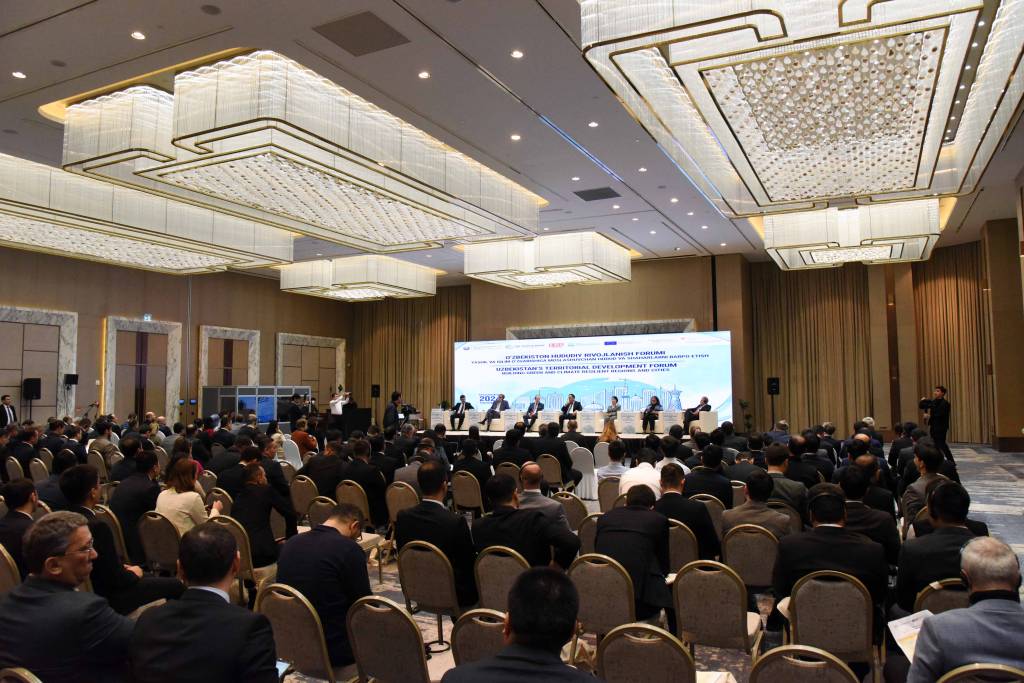
From December 2 to 6, 2024, the Uzbekistan Territorial Development Forum will take place, co-organized by the Ministry of Economy and Finance and the World Bank.
The event, which will bring together numerous local and international participants, will address the challenges and opportunities of the country’s rapid urban growth, adapt regions and cities to climate change, enhance their disaster resilience, and advance territorial development planning reforms.
The Forum is co-financed by the World Bank’s Europe and Central Asia Cities and Climate Change Program, sponsored by Austria’s Ministry of Finance, the European Union, and Switzerland’s State Secretariat for Economic Affairs (SECO).
Uzbekistan has declared 2025 the Year of Environmental Protection and Green Economy. This initiative is strategic for the country, highlighting its commitment to achieving environmental stability and adapting to climate change. Hosting a forum on developing green and climate-resilient cities as part of this initiative will significantly strengthen international cooperation in green growth.
Over half of Uzbekistan’s 37 million people reside in urban areas. By 2050, the urban population is projected to increase by 50%, exceeding 25 million. To meet the needs of the growing population and preserve the environment, systemic reforms are required in key areas of urban infrastructure, such as transportation, energy, and waste management. Special attention must be given to enhancing cities’ resilience to climate risks, including heatwaves and floods.
In Uzbekistan, the pace of urban migration outstrips economic growth, leading to unequal access to labor markets and public services. This underscores the need for modern mechanisms of urban management and planning.
The Uzbekistan Territorial Development Forum brings together over 200 local and international participants to discuss the abovementioned issues. Participants include officials from Uzbekistan’s ministries, state agencies, and city and regional authorities, as well as private sector leaders and international experts on urban and regional development from Asia, Europe, and North America.
They are joined by representatives from the World Bank, European Union (EU), Switzerland’s State Secretariat for Economic Affairs (SECO), United Nations Development Programme (UNDP), European Bank for Reconstruction and Development (EBRD), Asian Development Bank (ADB), and German Corporation for International Cooperation (GIZ).
The Forum will serve as a platform for discussing solutions to support Uzbekistan’s sustainable urbanization and the development of green, climate-resilient regions and cities. It will also foster collaboration among local and international experts, creating networks to support the government’s ongoing green territorial development and urban planning efforts.
Discussions will focus on managing urban expansion through strategies to contain urban growth and promote densification and urban renovation. Significant emphasis will be placed on developing green, climate-resilient cities by implementing cost-effective adaptation measures and strengthening local capacity for disaster resilience.
Forum participants will consider measures to reduce greenhouse gas emissions in cities by promoting public transportation, sustainable municipal solid waste management, and compact urban development. They will also consider ways to improve public service delivery for city residents, integrate green objectives into city masterplans, and enhance local government performance through better governance, citizen engagement, and green financing.
During the event, local and international experts will work together to develop a roadmap to guide green and climate-resilient territorial development in Uzbekistan. This roadmap will outline specific steps for territorial planning reforms, enhanced local governance, and sustainable and green urban growth strategies.
Recommendations from Forum participants will help shape the government’s vision for future investments and reforms in territorial development and urban planning. These efforts will be supported by international development partners working with Uzbekistan.
Additionally, some Forum participants will have a chance to visit the cities of Yangiyol and Samarkand to explore how local authorities manage urban development, planning, budgeting, and responding to environmental and climate challenges.
Upon the completion of the Forum, the MEF will announce several financial grants, which will be provided and implemented by international development partners, including the World Bank, EU, SECO, and ADB. These grants will support the development of master plans and climate action plans for cities across Uzbekistan. They will also enhance the capacity of local government officials in urban planning, local governance, and improving cities’ climate resilience.
[gallery-20655]
Nasiba Ziyodullayeva, UzA








